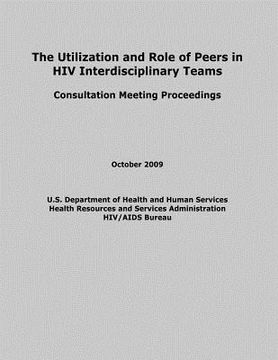Reseña del libro "The Utilization and Role of Peers in HIV Interdisciplinary Teams (en Inglés)"
On February 23, 2009, a consultation meeting was held to examine the use of peers in HIV interdisciplinary care settings. The meeting was convened by the U.S. Department of Health and Human Services (HHS), Health Resources and Services Administration (HRSA), HIVAIDS Bureau (HAB). Participants included HRSA representatives, Ryan White HIV/AIDS Program grantees, researchers, technical assistance providers, health care professionals, program managers and HIV positive peers. Participants heard about the ways in which peers were being used in the fields of HIV, cancer and diabetes to facilitate access to care, treatment and health-related services. The purpose of the meeting, explained Steven Young, HAB's Director of Training and Technical Assistance, was to gain greater insight into the benefits and challenges of having peers on health care teams, to identify the major components of an ideal peer program, and to make recommendations regarding ways in which peer interventions could be funded and sustained within HIV systems of care. Young explained that in the Ryan White HIV/AIDS Program, peers are HIV positive individuals who share identifying characteristics with individuals or population groups receiving care or services. Peers and clients share similar experiences and challenges related to class, race, age, gender, language, culture and recovery from substance abuse and/or trauma. These common characteristics often provide peers with deep insight into the feelings and behaviors of clients, and help them forge both personal credibility and trusting relationship with clients. In the field, said Young, peers are also called coaches, community health workers and patient navigators, among other titles. HAB's particular interest is in examining the role of peers on interdisciplinary health care teams, whose focus in the Ryan White HIV/AIDS Program is to engage and retain clients in high quality, HIV care. Young emphasized the important role that peers (also called consumers) have played in the Ryan White HIV/AIDS Program since its inception. Peers participate in program planning activities, serve as grant reviewers, participate on program advisory committees and boards, and hold positions as volunteers and staff at local health clinics and community-based organizations (CBOs). They serve as faculty of the AIDS Education and Training Centers program. HAB cooperative agreements and grants have supported leadership development for peers to promote their involvement in HIV/AIDS programs. "On an individual level, we have heard from peers that involvement in our programs helps them feel less isolated and gives them an increased sense of purpose," said Young. He added that peers can help improve HIV health care delivery and assessment of client needs, as well as reduce cultural and linguistic barriers, and stigma. Despite widespread acknowledgement within Ryan White that peers play a beneficial role, their function has not been well documented or codified. As a result, HAB is seeking guidance on: Training and support needs of peers; Ideal roles for peers (i.e., staff, volunteers, etc); Financial support for the peer role (grants, reimbursement, etc.); Identification of reasonable client and organizational outcomes related to the use of peers; and Suggestions on how peers might be integrated into specific, legislatively identified core services, such as medical case management and adherence support.

